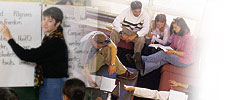 |
|
|
|
| Print | Back Education and Freedom Seemingly, we possess an insatiable and destructive need to control each other. If history teaches us anything, it is that we are terrified of relinquishing control. In past times and in other civilizations, parents often prearranged the marriages and selected the occupations of their children. Many aspects of our society have gradually moved away from this model of constraint. Many educators, however, feel a need to control the lives of their students through the rigid determination of their curriculum. Students, many of whom are otherwise creative or non-competitive, find themselves in an unfavorable situation: Although school may be untrue to their personal constitutions, they must complete the process and eventually graduate, in order to be accepted by society. Rather than considering a person's substance, our society only places value on a person's credentials. Many students react to this system by becoming indifferent; they react by not learning. In his book Schools Without Failure (1969), educational reform pioneer William Glasser, M.D. notes that prior to entering school, children are far more optimistic. Although reality is sometimes harsh, many children use their creativity to help them cope with adversity, and make life fun. Glasser notes that during his early childhood, he was never asked to succeed according to rigid and time-constrained standards. If he failed at a certain task, he was never labeled as a failure. He learned to use his brain for its basic function: thinking. In schools, however, children discover that they must use their brains mostly for memorizing rather than exploring their interests, expressing their ideas, or solving problems. Even worse, much of what they are asked to memorize is irrelevant to their world. Often, their reaction to this is either social withdrawal or destructive anger. Still, this process continues. When we force someone to memorize certain facts, and they replicate those facts on a test, we are satisfied that we have successfully controlled them. Educators must stop acting as controllers, and instead, become managers. We must be conscious of the knowledge that people who desire a system of rigid control are the most driven to obtain positions of power and authority. Unfortunately, most children are not capable of understanding what is happening to them in our present educational system. They are berated by a constant dialogue of blame and fault. They accept the system as the way things must be; realizing that one either must ‘play the game’, or accept the consequences of defying the norm. Very often, this results in anger or apathy. Coercive psychological systems violate our most fundamental concept of basic human rights. They violate individuals' rights that are guaranteed by the First Amendment to the United States Constitution and affirmed by many declarations of principle worldwide. |
|
|